




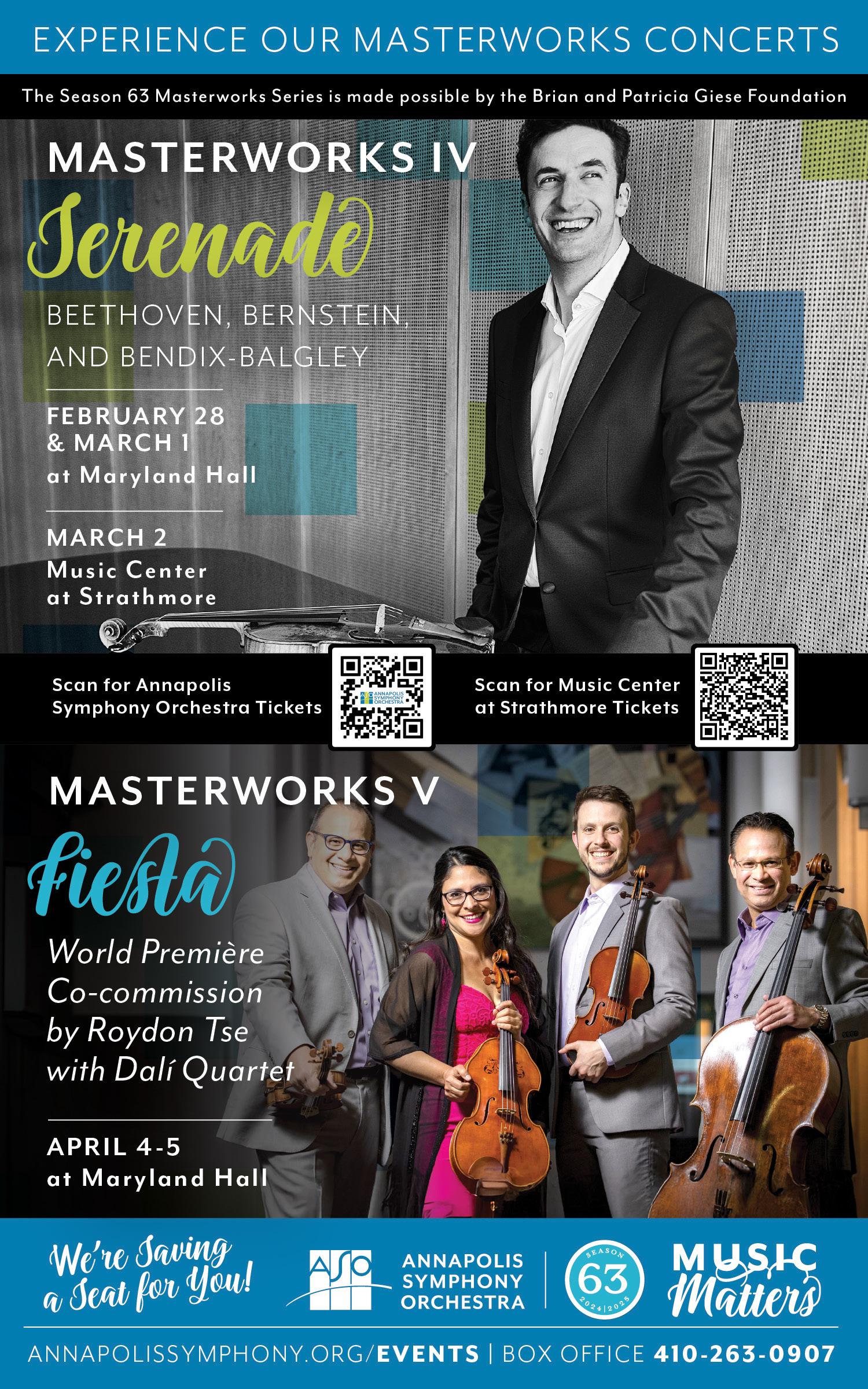









As I write, it’s night time in snowy Montreal. I flew here earlier today, and just finished a practicing session for the concerts we will perform this weekend. This is what my days are usually like - a combination of my passion for flying, and my passion for music, so I can’t complain!
The ASO will perform not one, but TWO of my favorite pieces, one of which I have played since I was a young boy, so I’m very excited! I am thrilled to perform with Maestro Novo and my amazing ASO colleagues.
Camille Saint-Saëns’ Violin Concerto No. 3 is not performed as often as it should be. I think after hearing it you will agree that it is full of charm, flowing melodies, and gratifying harmonic transitions that will rival any major violin concerto.
We will also perform Modest Mussorgsky’s Pictures at an Exhibition which continues the picturesque nature of the violin concerto and builds on it. There will be so many melodies you will recognize; My favorite is saved for last, “The Great Gate of Kyiv”. At one point, if you close your eyes, you will hear the prevalent melody in the movement that might remind you of the holiday season. When I hear it I imagine snow and bells. After this buildup, the entire orchestra joins to play that same melody two more times, with the last time finally resolving in a huge E flat Major chord played by everyone on stage. I guarantee you the ASO will blow the roof off, in a great way.
The program for this weekend’s concerts opens with Samuel Coleridge-Taylor’s Overture from The Song of Hiawatha . It is a piece I was not familiar with before I started preparing for this concert. I can share the importance of playing his overture with you both because of the artistic excellence evident in The Song of Hiawatha, a piece that was as popular as Handel’s Messiah and Mendelssohn’s Elijah when it premiered, but more wholistically, because of the vital need to include more composers of color in our symphonic programming. We also know Maestro Novo enjoys programming exceptional yet lesser known compositions which are important for all of us to get to know alongside the favorite pieces we are familiar with and love. No doubt The Song of Hiawatha is one of those exceptional pieces.
Speaking of Maestro Novo, did you know this year marks his 20th anniversary with the Annapolis Symphony Orchestra? I am incredibly proud to say I have served as the Concertmaster of this great orchestra for 15 of the 20 years Maestro Novo has
been our Music Director. It has been an honor and a pleasure to work with him, as I know it will continue to be in the future. If you run into Maestro Novo before or after a concert, or perhaps around town, take a minute to stop and share with him your favorite Annapolis Symphony Orchestra moment(s), and how thankful we are to have a growing orchestra in Annapolis, greatly due to his dedicated vision and hard work.
Following our performances at Maryland Hall, we will perform this program at the Strathmore Music Center on February 2nd. While we love our home at Maryland Hall, Strathmore showcases the caliber and talent of our ASO musicians to a whole different level. If you are a regular Maryland Hall patron, I highly recommend changing your Sunday plans and coming to hear the same concert at Strathmore. You will be blown away, guaranteed!
After we conclude this concert week, we still have a few more performances this year, and we hope we will see you at Maryland Hall, Strathmore, and at concerts with the Annapolis Symphony Academy. The Academy is a project I envisioned seven years ago with the support of the Annapolis Symphony Orchestra Board of Trustees, then Board Chair Laurie Berman, Maestro Novo, ASO’s former Executive Director, Patrick J. Nugent, my friend and colleague Julie Nolan, our awesome staff, and generous donors and sponsors. Little did we know that the project would grow into a multiple-location, multi-orchestra program with 150+ students that supports the community, promotes equity, helps those who cannot afford music lessons, and provides more opportunities for our ASO musicians. Don’t forget to follow the Academy’s concert schedules, especially ASA Day on May 18th. The Academy’s recitals, concerts, and events are an inseparable part of the vision and mission of the Annapolis Symphony Orchestra.
One last special shout out to my incredible sponsor, Jill Kidwell, who alongside the late David Kidwell supports me and the concertmaster chair for such a long time. Thank you Jill for years of friendship and support.
Did you know you can sponsor a musician? Ask one of our team members at (or after) the concert about that possibility.
Please enjoy tonight’s performance. We enjoyed preparing it for you. I would like to thank all of you for your continued patronage and support of the Annapolis Symphony Orchestra and all it does in our community.
See you at the concerts or maybe in the air one of these days, who knows! Wherever it may be, it will always be great fun.
Warm regards,

Netanel Draiblate

SHELLEY ROW, PE, CSP Chair
KATHERINE EDWARDS, MD Vice Chair
ANN WHITCOMB Vice President-Finance
ROBERT ARIAS
GEORGIANNA CROSBY
WILLIAM DAVIS
GINGER FROM SONJA GLADWIN
CHARLIE GRUDZINSKAS
COLLOT GUERARD
MICHELLE HELLSTERN
WILLIAM HOFF
DEB HOWE
TRUSTEE EMERITUS
MONIQUE Y. LANGSTON Secretary
STEPHEN SOTACK Treasurer
GERALDINE “MIMI” LADD JONES
JEANNE KELLY
ELIZABETH MAXWELL-SCHMIDT, MD
MARY MCKIEL, PHD Immediate Past Chair
MARIE TREANOR
FLORENCE CALVERT JILL KIDWELL
JOSÉ-LUIS NOVO
Artistic Director & Conductor
ANN TRAN FASO Board Representative
ORCHESTRA REPRESENTATIVE
ALEXANDRA MIKHLIN
Musicians’ Representative, Players’ Committee
The mission of the Annapolis Symphony Orchestra is to inspire, educate, and enrich lives near and far by creating extraordinary musical experiences with uncompromising artistic excellence.
With a 63-year history of artistic excellence, the Annapolis Symphony Orchestra is recognized as the largest and most distinguished performing arts organization in Maryland’s capital city. Under the direction of José-Luis Novo, the Symphony continues to rise in excellence and national reputation, performing Masterworks, Pops, Family Concerts, and special events. The Symphony reaches thousands annually with its free Pops in the Park concert, performances in partnership with the United States Naval Academy and the Annapolis Opera, and collaborative projects with other arts organizations and touring headliners. Additionally, ASO sponsors award-winning education concerts and outreach programs in community schools, sharing the joy of music-making with thousands of school children, including through the Annapolis Symphony Academy (ASA).
ANNAPOLIS SYMPHONY ORCHESTRA STAFF
ERICA BONDAREV RAPACH
Interim Executive Director
JULIE NOLAN
Director of Community Outreach, Grants Manager
SARAH JOHANSEN Director of Business Operations
OLIVIA REN Orchestra Librarian
MIRIAM FOGEL Director of Artistic Operations
MAYA MCATEE Office & Data Manager
DIANA LOVE Director of Marketing & Communications
DAVID SCIANNELLA Operations Manager
ANNAPOLIS SYMPHONY ACADEMY STAFF
NETANEL DRAIBLATE
ASA Director
HEATHER HAUGHN
ASA Department Head, Strings
KIMBERLY VALERIO
ASA Chair, Winds & Brass
JULIE NOLAN Director of Education
ANTHONY VALERIO
ASA Conductor, Aquarius Wind Ensemble
ANNAPOLIS SYMPHONY ORCHESTRA 801 CHASE STREET, SUITE 204| ANNAPOLIS, MD 21401 410-263-0907 (BOX OFFICE) | 410-269-1132 (ADMIN)
SHUN YAO
ASA Assistant Conductor
Under writer, The Philip Richebourg Ar tistic Director and Conductor ’s Chair

THE PHILIP RICHEBOURG ENCORE CIRCLE honors multi-annual pledges of $100,000+
Elizabeth Richebourg Rea, in honoring the legacy of her father, Co-Founder of the Annapolis Symphony Orchestra, created a legacy of her own. In 2011, she donated the largest single contribution in the history of the orchestra for the 50th Anniversary Season. This generosity transformed giving by inspiring future endowments of substantial amounts in addition to pledges spanning multiple years. Her pioneering leadership has created new levels of support, enabling the A SO to expand our work on stage and in the community. Elizabeth is underwriter of the Artistic Director and Conductor’s Chair in her father’s name and in addition is the founding member of the Philip Richebourg Encore Circle.
Elizabeth Rea is a fine ar t photographer and curator She has curated numerous Joseph Cornell exhibitions and two Roy Lichtenstein Retrospectives. Elizabeth is President of the Dungannon Foundation, sponsor of the Rea Award for the Shor t Stor y. She ser ves on the Peggy Guggenheim Advisor y Board and is an Honorar y Trustee of the Solomon R Guggenheim Foundation.
Co-Founder and First Board President Annapolis Symphony Orchestra

1972
“My father Philip Richebourg conducted his own orchestra ever y da y of his life. He personified exactitude and precision in business; in ser vice to his community and in leadership on numerous Boards. He was meticulous in his passions as pilot, musician, archi vist. Dedicated to each task at hand my father approached all things in life as if resolute in achieving one goal, that of per fect harmony ” professional orchestra, Philip was at the helm every step of the way. His commitment, dedication, and passion for musical awareness leaves an indelible mark on the history of the A SO. The Annapolis Symphony Orchestra would not be what it is today without him.
The Annapolis Symphony Orchestra is indebted to Philip Richebourg, Co-Founder and First Board President (1967-1974). Philip Richebourg ’s stalwart support, organizational vision and strong leadership during its formative years helped solidify the orchestra financially and administratively, ensuring its longevity and signature as one of Maryland’s most distinguished performing arts organizations. Philip passionately supported the Annapolis Symphony Orchestra as it sought to enrich the lives of the community through classical music and educational programs. From the modest beginnings of a small community ensemble to the present acclaimed

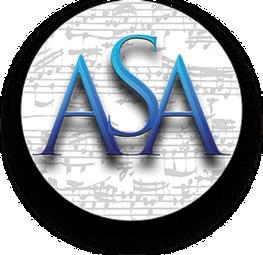








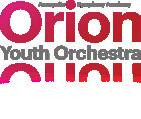
THE
PHILIP RICHEBOURG CHAIR
Spanish-born José-Luis Novo has instilled a new and vibrant artistic vision into the Annapolis Symphony Orchestra since his appointment as Artistic Director and Conductor of the Maryland-based symphony in 2005. Highlights of Novo’s tenure include numerous appearances at the Music Center at Strathmore with violinists James Ehnes, Anne Akiko Meyers, Leticia Moreno, and Chee-Yun, pianist Olga Kern, late cellist Lynn Harrell, guitarist Manuel Barrueco, pipa virtuoso Wu Man, and the Naval
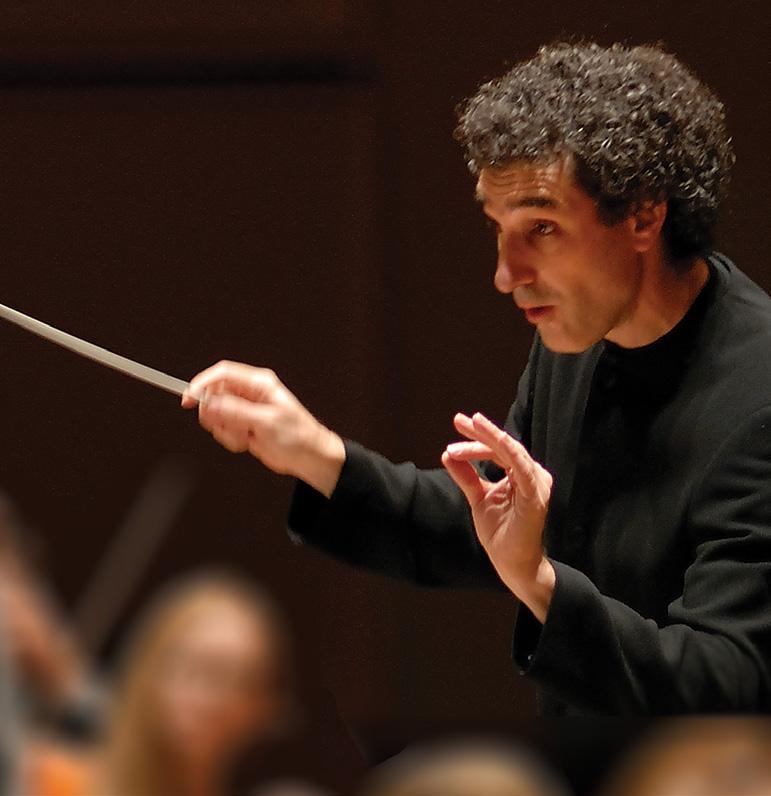
Academy Glee Club. Also remarkable are a 2012 return appearance at the Clarice Smith Performing Arts Center with mezzo-soprano Denyce Graves, national broadcasts on NPR’s Performance Today, debut TV broadcasts on Washington’s WETA Metro PBS, the launching of the ASO’s award-winning streaming platform Symphony+, the creation of the Annapolis Symphony Academy, and the ASO’s first commercial CD commemorating the 300th anniversary of the signing of the City of Annapolis’ Royal Charter. In July of 2022, Maestro
The Artistic Director’s Chair is graciously underwritten by Elizabeth Richebourg Rea, daughter of Philip Richebourg, Annapolis Symphony Orchestra Co-Founder and First Board President (1967-1974).
“My father conducted every day of his life as if resolute in achieving perfect harmony. I can think of no greater legacy than naming the Artistic Director’s Chair after my father, Philip Richebourg.”
Novo and the ASO stunned audiences on both sides of the Atlantic in a debut international tour to Spain with guitar virtuoso Pepe Romero as guest soloist.
Maestro Novo’s continuous drive for artistic excellence, innovative thematic programming, and collaborations with some of today’s most respected guest artists keeps generating unprecedented artistic growth and enthusiastic reviews from publications such as The Washington Post and The Baltimore Sun
In addition to his directorship of the ASO, Maestro Novo held an impressive thirteen-year tenure as Music Director and Conductor of the Binghamton Philharmonic in New York state from 2003 to 2016. Prior to this, he served as Assistant Conductor of the Cincinnati Symphony Orchestra under both late Music Director Emeritus Jesús LópezCobos and former Music Director Paavo Järvi, and the Cincinnati Pops Orchestra under the late Erich Kunzel.
Recent and upcoming guest conducting engagements include debut appearances
with the Rochester Philharmonic, the Grand Rapids, Hilton Head, Palm Beach, Alexandria, and South Bend Symphony Orchestras, and return appearances with the Baltimore Symphony, the Fresno Philharmonic, Symphoria, and a Kimmel Center debut in Philadelphia conducting the Curtis Institute Orchestra. After a successful debut with the Thailand Philharmonic Orchestra (TPO) for the Thailand International Composition Festival in 2015, Maestro Novo has been invited back regularly to guest conduct the TPO on several occasions. Other guest conducting engagements have included appearances with the Symphony Silicon Valley; the Minnesota Orchestra; the Syracuse, Modesto, Windsor, Stamford, Tulsa, and Tallahassee Symphonies; the Cincinnati Chamber Orchestra; the Cleveland and Abilene Philharmonics; and most of the major Spanish orchestras.
José-Luis Novo has also fostered a reputation as a keen educator of young musicians. He has held conducting

positions with the Cincinnati Symphony Youth Orchestra, University of Maryland Symphony Orchestra, Miami University Symphony Orchestra, and National Repertory Orchestra, and has been on the conducting faculty at the Eastern Music Festival in Greensboro, North Carolina since 1999. In addition, he has conducted many noteworthy college and youth orchestras such as the Curtis Institute Orchestra, the Cleveland Institute of Music Orchestra, the Bard Conservatory Orchestra, the Ithaca College Symphony Orchestra, and the Portuguesa State Youth Orchestra of the Venezuelan El Sistema. Under the auspices of the Annapolis Symphony Academy, he presided over the debut of its Orion Youth Orchestra, conducting the inaugural concert in June 2022.
Maestro Novo was featured in the League of American Orchestras Symphony magazine in “Podium Powers,” an article about emerging Hispanic conductors in the United States of America. He holds music degrees from the Cleveland Institute of Music, Yale University, and the Royal Conservatory of Music in Brussels, and is the recipient of a 2010 Annie Award in Performing Arts from the Arts Council of Anne Arundel County, a 2008 American Society of Composers, Authors, and Publishers Adventurous Programming Award, and a 2005 Broome County Arts Council Heart of the Arts Award.
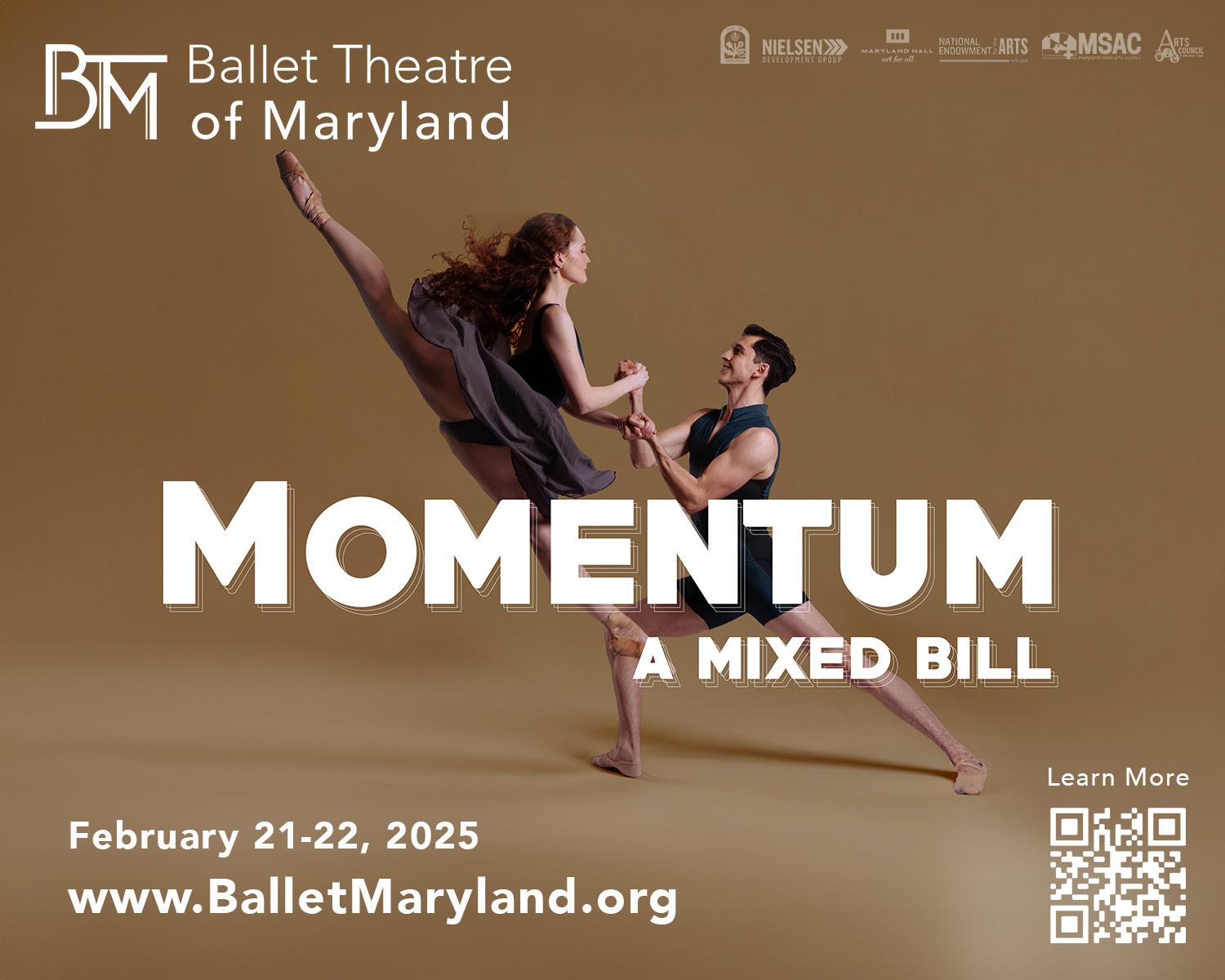
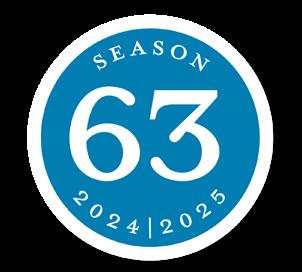
January 31, 7:30 PM | February 1, 7:30 PM
MARYLAND HALL
February 2, 3:00 PM
MUSIC CENTER AT STRATHMORE
José-Luis Novo, Artistic Director & Conductor The Philip Richebourg Chair
Netanel Draiblate, violin
Overture from The Song of Hiawatha, Op. 30, No. 3 Samuel Coleridge-Taylor (1875–1912)
Violin Concerto No. 3 in B minor, Op. 61 Camille Saint-Saëns (1835–1921)
I. Allegro non troppo
II. Andantino quasi allegretto
III. Molto moderato e maestoso
Pictures at an Exhibition Modest Mussorgsky (1839–1881) Promenade (orch. Maurice Ravel)
I. Gnomus (The Gnome) Promenade
II. Il vecchio castello (The Old Castle) Promenade
III. Tuileries
IV. Bydło (Cattle) Promenade
V. Ballet of the Unhatched Chicks
VI. Samuel Goldenberg und Schmuÿle
VII. Limoges—Le marché (Limoges—The Market)
VIII. Catacombae: Sepulcrum romanum (Catacombs: Roman Tomb) Cum mortuis in lingua mortua (With the Dead in a Dead Language)
IX. The Hut on Hen’s Legs: Baba Yaga
X. The Great Gate of Kyiv
Photography and video/audio recording are not permitted in the concert hall. Please silence all electronic devices. Thank you.
VIOLIN I
Netanel Draiblate, Concertmaster
Nicholas Currie, Associate Concertmaster
Hanbing Jia, Assistant Concertmaster
William Wang
Qian Zhong
Rachael Stockton
Abby Armbruster
Wan-Chun Hu
Susan Benac
Heather Haughn
Jennifer Rickard
Claudia Chudacoff
VIOLIN II
Chri stian Tremblay, Principal
Alexandra Mikhlin, Acting Associate Principal
Karin Kelleher
Sally Stallings Amass
Megan Gray
Katelyn Lyons Peaden
Sara Schneider
Angela YuTing Chew
VIOLA
Sarah Hart, Principal
Brian Shoop, Acting Associate Principal
Kate Zahradnik
Rachel Holaday
Susan Taylor Dapkunas
Kunjing Dai
Heidi Remick
Michael Sinni
Todd Thiel, Principal
Pei Lu, Associate Principal
Nicole Boguslaw
Daniel Shomper
Alison Bazala Kim
MaryAnn Perkel
Catherine Mikelson
Jes sica Albrecht
BASS
Pat rick Raynard, Principal
Benjamin Crofut, Associate Principal
Adriane Irving
Brandon Smith
Kimberly Parillo
Jason Gekker
FLUTE
Ki mberly Valerio, Principal
Lauren Sileo
Lor i Kesner
OBOE
Fat ma Daglar, Principal
Amanda Dusold
Mich ael Homme
CLARINET
Brian Eldridge, Acting Principal
David Drosinos
Sara Reese
BASSOON
Asha Kline, Principal
Jimmy Ren
Lynn Moncilovich
SAXOPHONE
Tim Powell
HORN
Alex Kovling, Principal
Shane Iler, Associate Principal
Ho Hin Kwong
Anthony Valerio
Kevi n Grasel
TRUMPET
Chri stopher Sala, Principal
Christopher Buchanan
Andrew Fremder
TROMBONE
David Sciannella, Acting Principal
Myles Blakemore
Jay Heltzer
TUBA
Jake Fewx, Principal
TIMPANI
Cu rt Armbruster, Principal
PERCUSSION
Wil liam Kan, Principal
Anthony Asero
Andrew Henry
Robert Jenkins
Eva n Saddler
HARP
Ma ryanne Meyer, Acting Principal
Astrid Walschot-Stapp
CELESTE
Tomoko Kanamaru, Acting Principal

Arthur Miller’s


Cole Porter, Guy Bolton, and P.G. Wodehouse’s

William Shakespeare’s



Overture from The Song of Hiawatha, Op. 30, No. 3
Born Aug. 15, 1875, London
Died Sep. 1, 1912, London
Composer Samuel Coleridge-Taylor, named after the English Romantic poet Samuel Taylor Coleridge, was born to a white mother and a Black father. His father returned to his native Sierra Leone in 1876—and therefore took no part in Coleridge-Taylor’s upbringing— because he was unable to establish an independent medical practice because of his race. This is indicative of just some of the barriers to Black Englishmen at the time. Coleridge-Taylor was interested in his African heritage, leading him to what was then perceived as a “folk” compositional style. The use of folk styles, especially in development of a particular ethnic or national idiom, was common in the late nineteenth century, and Coleridge-Taylor was both influenced by and compared to composers such as Antonín Dvorˇák, Edvard Grieg, and Edward Elgar. In his
interest to highlight African culture, Coleridge-Taylor was also influenced by the African-American activists W.E.B. DuBois and Booker T. Washington, poet Paul Laurence Dunbar (with whom he was friends), and the Fisk Jubilee Singers.
Having studied music and sung as a chorister throughout his childhood, Coleridge-Taylor enrolled in the Royal College of Music in 1890 to study violin and piano. He quickly showed talent as a composer, publishing his first piece at age 16, and he eventually switched his focus to composition. In 1898—a year after completing his studies at the Royal College of Music—Elgar recommended Coleridge-Taylor for a commissioning project, naming him “far and away the cleverest fellow going amongst the young men.” Later that year, ColeridgeTaylor completed Hiawatha’s Wedding Feast , the first cantata in the eventual trilogy The Song of Hiawatha , which is based on and sets texts from the epic poem of the same name by American poet Henry Wadsworth Longfellow. Coleridge-Taylor’s interest in the mythological character of Hiawatha (who is not based on the sixteenthcentury Iroquois chief) is logical when considering the Romantic conflation of communities perceived as “ethnic.”
While writing the second cantata for The Song of Hiawatha , Coleridge-Taylor decided to compose an instrumental overture to complete the epic work. Conducted by the composer, the overture premiered at the Norwich Music Festival on October 7, 1899, and received rave reviews that added to Coleridge-Taylor’s popularity. The work begins with the harp accompanying motives that are pulled from the spiritual “Nobody Knows the Trouble
I’ve Seen,” which Coleridge-Taylor heard performed by the Fisk Jubilee Singers. After detached chords in the low register, the strings take over with a full statement of the melody. The rhythmic changes to the melody—grace notes, exaggerated dotted figures, and trills— were quintessential markers of “folk” music in the nineteenth century, and often used by classical music composers when trying to evoke a non-Western culture or musical style.

Violin Concerto No. 3 in B minor, Op. 61
Born Oct. 9, 1835, Paris
Died Dec. 16, 1921, Algiers
The young Camille Saint-Saëns began piano lessons at age three and made an impressive public debut, performing concertos by Mozart and Beethoven, in Paris at age ten. Saint-Saëns entered the Paris Conservatoire in 1848, studying organ, composition, and orchestration. Although he did not win the famed Prix de Rome, he won a different
composition prize in 1852, as well as a prize for organ performance in 1851. In his professional career, Saint-Saëns was at various points an organist, pianist, conductor, impresario, critic, and composer. As a composer, Saint-Saëns was influenced by the programmatic pieces of Liszt as well as by the Classical Viennese style as defined by Haydn, Mozart, and Beethoven. Saint-Saëns helped to revive the music of these three composers in France as well as the music of Bach, Handel, and seventeenth-century Baroque dance forms. His interest in historical music and the Classical style is evident in the Violin Concerto No. 3 in B minor, composed in 1880.
Saint-Saëns uses the traditional concerto form for his third violin concerto: a faster sonata form first movement, slower second movement, and a fast finale third movement. The first movement begins with an appassionato violin solo, immediately showing off the soloist’s range, dexterity, and emotion: the main goal of a solo concerto. As the tonality shifts to major, the solo violin introduces the lyrical and flowing second subject, marked dolce espressivo, accompanied by chords in the strings. After the development and recapitulation of the two subjects, the movement ends with an extended coda. The peaceful second movement is a barcarolle, a Venetian folk song sung by gondoliers, their rowing and the water’s movement imitated by the 6/8 meter. This form was also popular in Romantic opera, a common genre for Saint-Saëns, and the exchange of melody between soloist and woodwinds shows an influence from Mozart. At the very end of the movement, the soloist plays arpeggio runs using harmonics in a masterful
display of skill. A unique timbre is created as the clarinet accompanies the arpeggios in octaves. The third movement opens with an accompanied cadenza before settling into the marchlike theme for the finale. This mood is contrasted by the interjection of the second theme, which is graceful with a slower rhythmic pulse. At the end of the work is a majestic chorale— characteristic of Saint-Saëns during this period of composition—in B major. The violin echoes the brass in a final coda that shows off the soloist’s virtuosity.

at an Exhibition
Born Mar. 21 (O.S. Mar. 9), 1839, Karevo
Died Mar. 28 (O.S. Mar. 16), 1881, St. Petersburg
Born in west of Moscow, Russian composer Modest Mussorgsky had a keen interest in Russian culture and history, and would eventually become known for his participation in the circle of composers including Mily Balakirev,
César Cui, Nikolai Rimsky-Korsakov, and Alexander Borodin—known with Mussorgsky as “The Five” or the “Mighty Handful”—who were dedicated to creating and promoting a Russian compositional style. Mussorgsky studied piano as a child and continued studying music throughout his secondary school training in St. Petersburg, as well as during his time at the Cadet School of the Guards where he trained to be a military officer, a typical career path for someone of the gentry. He was commissioned as an officer in the Russian Imperial Guard in 1856 and met Borodin that same year. As Mussorgsky became more involved in the musical circles of St. Petersburg, he was introduced to Cui (also a military officer) as well as Balakirev, with whom Mussorgsky took composition lessons. Russian places, landmarks, myths, and historical figures were common inspirations for Mussorgsky, demonstrating his interest in Russian nationalism. His famous opera Boris Godunov, for example, is based on a late sixteenth-century tsar. Kartinki s vïstavki ( Pictures at an Exhibition) was composed for piano in June 1874, shortly after the completion and success of Boris Godunov. Pictures at an Exhibition is based on a memorial exhibit of works by Russian painter Viktor Hartmann, a friend of Mussorgsky’s who had died in 1873. Mussorgsky’s own struggles with alcoholism and mental health led to a steady decline, and he died at just 42 years old, eight years after composing Pictures . His penchant for leaving works unfinished—as well as his colleagues’ opinion that his technique was unrefined—led to numerous posthumous editions, especially by Rimsky-Korsakov, often with substantial revisions of Mussorgsky’s works.
Pictures at an Exhibition was published in 1886, largely intact to Mussorgsky’s manuscript. The piano suite was orchestrated several times beginning in the late nineteenth century, but the most well-known version that has become the standard orchestral score was completed by Maurice Ravel in 1922.
Pictures at an Exhibition musically depicts walking through the art exhibit honoring Hartmann and his artwork:
Promenade: The opening section is unnumbered in the manuscript piano score, demonstrating that the music does not correlate to a painting by Hartmann. Rather the Promenade creates the action of walking through the exhibit, with a moderate tempo with regular rhythms. The melody is modal, evoking Russian folk music, and has similarities to a melody used in the coronation scene of Boris Godunov. The Promenade theme returns throughout the work, interspersed between the different movements, as the viewer (or listener) takes in the different paintings.
I. Gnomus (The Gnome): While Hartmann’s sketch of this is lost, the critic Vladimir Stasov, who knew both Hartmann and Mussorgsky, describes it as a child’s wooden toy with “crooked little legs.” The opening sforzando melody suggests menace, and its irregular interruptions throughout the movement depict the uneven gait. Chromaticism and other non-functional harmonies are used throughout, again demonstrating an influence in folk music.
[Promenade]: Unnamed in the original manuscript, this shorter section recalls the first two phrases of the Promenade.
II. Il vecchio castello (The Old Castle): According to Stasov, the corresponding painting showed a castle and a troubadour, or a poetsinger from medieval southern France. The medieval era is evoked with the modal Aeolian melody; the addition of the saxophone to the orchestra shows the orchestrator Ravel’s interest in timbre. There is a persistent pedal tone throughout the movement, a compositional characteristic of Mussorgsky.
[Promenade]: This quick section prepares for the next movement by changing the key.
III. Tuileries: Set in the famed Tuileries Gardens in Paris, this painting (now lost) and movement illustrates young children playing. Their cheerful energy is evoked through the quick and gentle lines in the high woodwinds and use of the high register.
IV. Bydło (Cattle): This movement begins suddenly, and according to Stasov, references a Polish cattle cart. However, no such image appeared in the exhibit of Hartmann’s works, and so there is speculation as to the inspiration for the movement. No matter the scenario, the low brass and regular rocking rhythms create the plodding movement of the cattle, and the strings sing a folk melody.
[Promenade]: Continuing the darker mood from the previous movement, Mussorgsky recalls the Promenade theme with a slower tempo and in a minor key.
V. Ballet of the Unhatched Chicks: Referencing Hartmann’s costume sketches for the ballet 1870 Trilby, performed in Moscow, the movement
depicts children who are dressed up as hatching canaries. The plucked strings and grace notes in the high winds create the effect of little beaks trying to tap open a shell and small flaps of wings. Quick, small bird steps are heard in the walking line in the bassoon and strings.
VI. Samuel Goldenberg and Schmuÿle: This movement references two pencil sketches by Hartmann, one entitled “A Rich Jew in a Fur Hat,” and the other “A Poor Jew.” They were done when Hartmann visited Sandomierz, Poland, including the Jewish ghetto. The unison modal, ornamented melody evokes Yiddish music, and the difference in economic status is perhaps heard in the sharply contrasting brass melody.
VII. Limoges—Le marché (Limoges— The Market): While it is not clear which of Hartmann’s 75 works of Limoges were in the exhibition, the hustle and bustle of the French marketplace is heard immediately in the music. The accents and quick features of different instruments create the effect of dialogue.
VIII. Catacombae (Sepulcrum romanum) (Catacombs: Roman Tomb): Suddenly, the low brass introduce the Roman catacombs underneath Paris. Hartmann’s watercolor shows stacks of skulls, and the theme of death is heard in the spaced chords that create harmonic ambiguity. These chords, instead of a melody, dominate the movement.
Cum mortuis in lingua mortua: Translating to “with the dead in a dead language,” this iteration of the Promenade theme is not a separate movement in the original piano score.
IX. The Hut on Hen’s Legs: Baba Yaga: The movement’s title references Hartmann’s sketch for a clock that realizes the house of Baba Yaga, an evil witch of Russian folk tales. The accents, sharp timbre, low register, and tonal ambiguity create a threatening atmosphere, fitting for a witch who was told to eat children and crush their bones as she travels around in her house built on chicken legs.
X. The Great Gate of Kyiv: In this fantastic finale, Mussorgsky references the watercolor Hartmann entered in the competition for a design to rebuild the city gates of Kyiv, Ukraine, which was controlled by Russia at the time. The movement begins with a bright processional, which is interrupted by a quiet Russian Orthodox hymn, “As You Are Baptized in Christ,” in the bassoons and clarinets. Strings joyfully enter and after another hymn, the pulsating chords that layer atop each other imitate specifically Russian bell ringing. The layers build to a percussiondominated climax, bringing the piece to a majestic close.
Program notes by Elizabeth Massey, Ph.D.



ailed as “an extremely gifted violinist with a strong stage personality and charisma,” Netanel Draiblate has concertized across four continents. The versatile artist performs as a soloist, chamber musician, and recording artist and the Washington Post has recognized him as “a violinist who combines confidence and virtuosity with a playful musical personality.”
Recent highlights include performances of the Tchaikovsky Violin Concerto with the Annapolis Symphony Orchestra, James Stephenson’s violin concerto Tributes with the Lake Forest Symphony, Mendelssohn’s Violin Concerto with the Baltimore Chamber Orchestra featuring his own cadenza, and Lou Harrison’s Suite for Violin, Piano and Chamber Orchestra with the PostClassical Ensemble in Washington, DC. Previous engagements include appearances with
the American Symphony Orchestra at Carnegie Hall, Israel Chamber Orchestra, Brasília Concert Society Orchestra, and Turkey’s Bursa State Symphony Orchestra.
Active as a chamber musician, Mr. Draiblate has collaborated with Pinchas Zukerman, Yo-Yo Ma, Itzhak Perlman, Jaime Laredo and Cho Liang Lin, performing in many of the world’s premiere venues. He recently made his Ravinia debut, performed with members of the New York Philharmonic as part of the Lancaster International Piano Festival, made his Canadian debut, performed on the Friday Music Series at Georgetown, was featured in special performances at the Holocaust Museum LA and in Maryland for the America-Israel Cultural Foundation, and for the last three seasons served as artist in residence at the Nuevo Mundo
Festival in Aruba. He also led a string quartet in a special program celebrating the 50th anniversary of GermanIsraeli diplomatic relations at Carnegie Hall, with an encore performance in Washington, DC for the Embassy Series. Mr. Draiblate tours with his duo partner, pianist Lura Johnson, as Times Two, and they also recorded the album Perspectives (Azica).
A sought-after teacher, Mr. Draiblate is the Founder and Director of the Annapolis Symphony Academy and was the Director of Chamber Music at Georgetown University. He has held
faculty positions and led master classes at schools and festivals across the globe. Mr. Draiblate is currently concertmaster of the Annapolis Symphony Orchestra and the Washington, DC-based PostClassical Ensemble. He has also served as concertmaster of Lake Forest Symphony, Tel-Aviv Soloists Ensemble, World Youth Orchestra, Young Israel Philharmonic Orchestra, and held a leading position with the historic WestEastern Divan Orchestra under the direction of Maestro Daniel Barenboim.








Inspired by Mussorgsky

In an extraordinary fusion of art and music, APEX Arts and ArtFarm Studios partnered to create a unique visual experience for the Annapolis Symphony Orchestra’s upcoming performance of Modest Mussorgsky’s celebrated composition, Pictures at an Exhibition .
This creative initiative reverses the inspiration that birthed Mussorgsky’s 1874 masterpiece, which was originally inspired by the works of Russian painter Viktor Hartmann. Students from APEX Arts and ArtFarm Studios listened to Mussorgsky’s evocative music and translated its emotional and visual energy into stunning original artworks. These student-created pieces will serve as a stunning visual accompaniment during the live January 2025 performances at Maryland Hall.

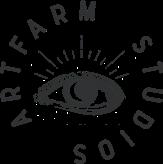



In the spring of 2024, FASO was approached with the idea of pairing the music of Modest Mussorgsky’s Pictures at an Exhibition with visual arts. As a very brief background, Mussorgsky composed the piece as a 10-movement piano suite in memory of his friend, the architect and painter Viktor Hartmann. The composition is a musical depiction of some of Hartmann’s works.

Nurturing young talents has always been a mission of ASO and FASO, exemplified by the growth and success of the Annapolis Symphony Academy. So featuring student visual artists is a natural extension of our work. FASO accepted the challenge. It was indeed a challenge, and more than once I wondered if the project would ever get off the ground. Alison Harbaugh and Art Farm jumped on board at once. But we suffered delays due to the school summer break. Many emails and phone calls later, we got our core group of collaborators to the table. Alison’s enthusiasm was infectious and soon director David Kauffman, Senior Manager of AACPS Apex Arts magnet program threw in his support. Alison organized the workshop, and gathered and supervised the student artists. I defer to Alison to fill in the artistic process. Needless to say, the resulting artwork revealed youthful imaginations and incredible creativity.
FASO is once again thrilled to be part of a community-wide project. In addition to managing the artistic components of this endeavor, Alison and Art Farm also took on the task of display and photography. We thank Anne Arundel County Public Libraries, especially Christine Feldmann, Director of Marketing and Communications, and Diane Benner, Manager of the Michael E. Busch Annapolis Library, for showcasing the art works in a large wall display so the public can enjoy the art and listen to the music. We thank Jackie Coleman and her staff for facilitating display space at Maryland Hall. Please be sure to visit the exhibit in the display space near the ASO offices during intermission or after the show. FASO is most grateful for the generous financial support from Whole Lotta Love. What makes this donation special is that it’s coming from a student group created by Gemma Love that supports other students. Vice president Marguerite Cole and I took on this task with much trepidation. We put out the call for participation and a whole lotta folks answered. So many in the greater Annapolis area contributed to produce what you see tonight. I hope you enjoy our version of Pictures at an Exhibition .
Sincerely,

Ann A. Tran
Leading this collaborative project between the Friends of the Annapolis Symphony Orchestra and young artists in our community has been a joy. When asked to bridge classical music and visual art, I knew we had an exciting opportunity to challenge students to explore creativity in a new way.
We invited students from Anne Arundel County Public Schools’ APEX Arts middle and high school programs to experience Mussorgsky’s Pictures at an Exhibition with fresh eyes and ears. ArtFarm teachers assigned one movement of the composition to each student to listen to, intentionally without any context about its inspiration. This blank slate approach was essential – we wanted their interpretations to flow purely from their emotional response to the music.
The creative process began with students creating word lists of their feelings and impressions while listening. These stream-of-consciousness responses then evolved into preliminary sketches as they translated their written thoughts into visual elements. At ArtFarm, we believe deeply in the importance of process, so we provided a variety of materials – charcoal, alcohol inks, watercolor, pencils, paint markers, and collage supplies – allowing each artist to choose their preferred medium.

What emerged on their wooden canvases was remarkable. Their artwork often aligned surprisingly well with both Mussorgsky’s musical intentions and Hartmann’s original paintings that inspired the composition, despite the students having no prior knowledge of either. Watching them deeply engage with classical music, many for the first time, and translate those auditory experiences into visual art was fascinating. Their concentration was intense, their interpretations both personal and profound.
The resulting exhibition showcases not just finished artworks, but the power of cross-disciplinary arts education. The synchronicity between the students’ artwork and the original inspirations behind Mussorgsky’s composition validates our faith in young artists’ intuitive abilities. It demonstrates beautifully how art speaks across centuries, mediums, and generations when we create space for genuine exploration and interpretation.
Alison Harbaugh, ArtFarm Studios
Alison Harbaugh 410-570-1581 (c) Photographer, Filmmaker, Teacher
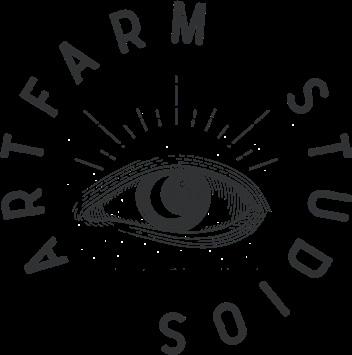
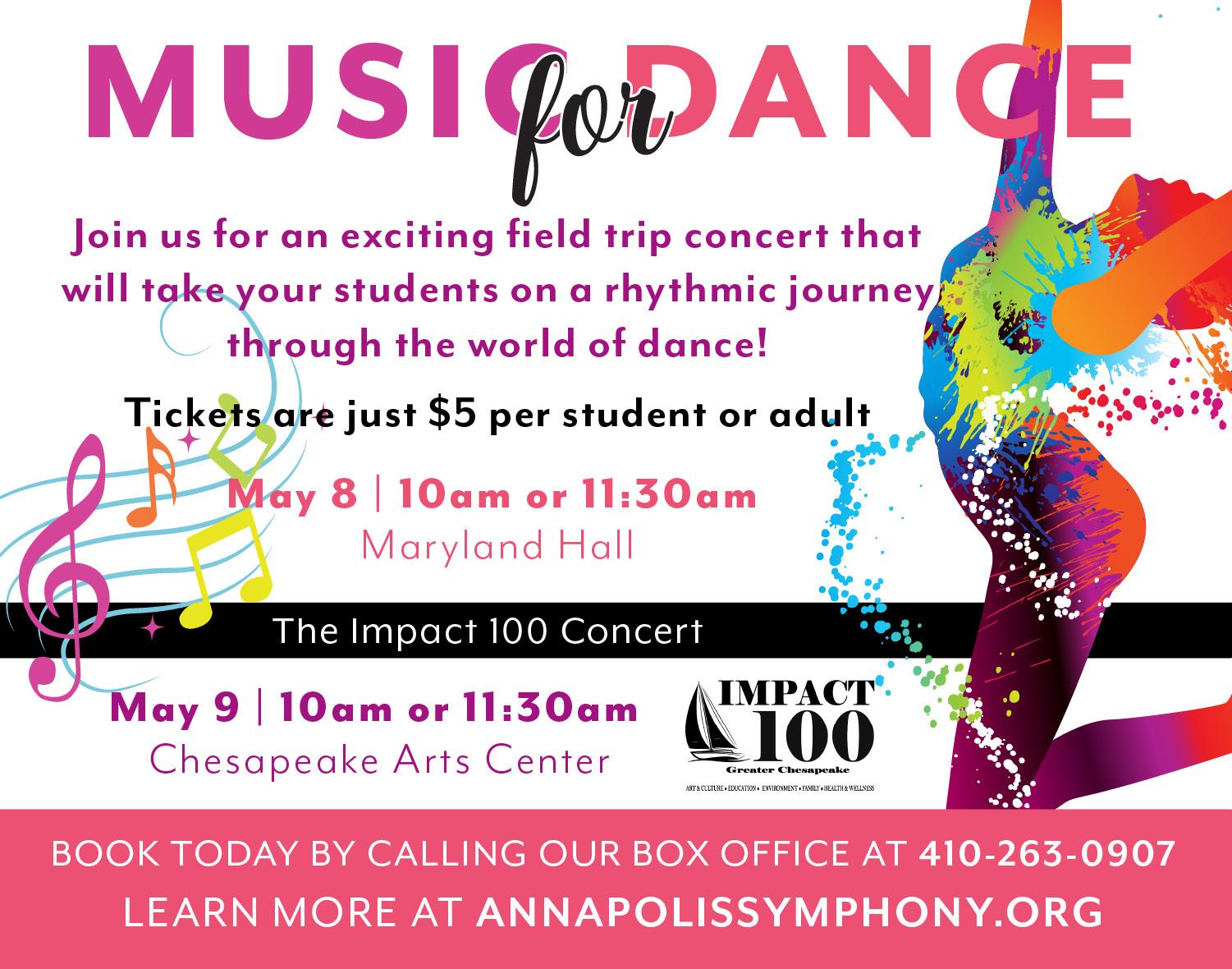


When I was about 5 years old, my mother introduced me to a famous Hawaiian maker of ukeleles. It was our family’s Jack Johnson era, and I was hooked on the sounds I could produce from the strings of my first instrument. Later, my music teacher at West Annapolis Elementary School, Clair Stein, encouraged me to play viola, another string instrument. That year my mother bought me several vinyl recordings of famous symphonies, and I grew a love for classical music. When I was 12 years old, struggling with the drama of the pre-teen years, she cuddled up on my bed with me to watch endless YouTube videos of Led Zeppelin. I was entranced with the artistry (and hair) of Robert

Plant and the mastery of Jimmy Page, so much so that I took up guitar. Last year I was gifted an amplifier and electric guitar, and now my entire family is sharing the joy of music with me.
I’ve always had a string instrument at hand, and I’ve always had a deep love for music. At the same time, I’ve loved visual art. My mother will tell you that I sat for hours even as young as age 2 while she worked, doodling, drawing, coloring, crafting, and then painting. My art teacher at West Annapolis, Danielle Shuey, always encouraged me, and allowed me to create works that were shown in exhibits like the one we are presenting this weekend. Alison Harbaugh has also supported my art, always encouraging me to welcome my
artistic spirit in the inviting and safe spaces she creates for young people.
For all these reasons - my love for music and art, and my love for visual art in particular - I was very happy to offer FASO a grant to help pay for art supplies and teacher instruction for this project. I founded Whole Lotta Love in 2020 in hopes that I could help other students. Whole Lotta Love has engaged the entire community - students, teachers, business people, politicians, and others - in service to young people. Our signature projects include the Annapolis Angel Tree, which has paired children in need with generous sponsors for five years, and has helped more than 1200 children to date. We’ve collected period products that were distributed to three schools, paid for bus transportation for unified sports teams, sent hundreds of school supplies to Paschal Sherman Indian School, collected new cold weather clothing for students who needed it for nature immersion field trips, and organized book drives so elementary aged kids could pick and choose as many books as they could hold for free. We are students helping other students, with love.
I’m very blessed to have been allowed access to art, in all its forms, for all of my life. Growing a love and affinity for the arts includes workshops exactly like this collaboration, which fosters exposure to the wonder of art, and importantly, stirs imagination and curiosity. The confidence that this one project might impart to a young artist will last a lifetime, and can make
all the difference in their decision to hone their craft and learn even more about art and culture. They deserve your appreciation of their artwork, and they have my congratulations. I am so impressed with their pieces, and hope they had fun in the process.
Thank you to Mr. Kauffman, for engaging APEX Arts Students in the project, to Mrs. Feldmann for facilitating the show at the Annapolis library, to Alison for bringing this exhibit to life so beautifully, and to Ann Tran and Maggie Cole for pushing forward to completion despite many obstacles. Ann and Maggie personally donated funds, effectively doubling the donation of Whole Lotta Love, and thereby making this small dream a reality.
Respectfully,

Gemma Love Founder, Whole Lotta Love




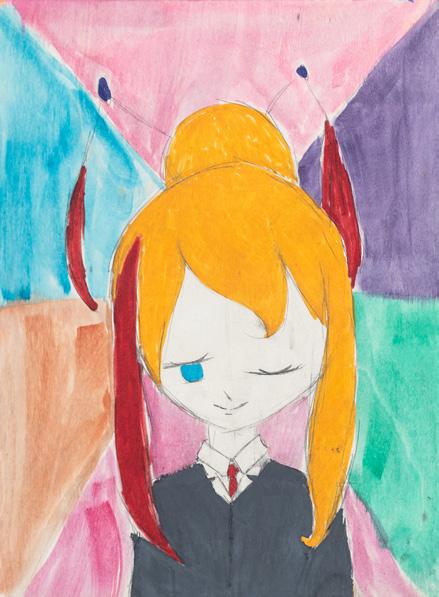
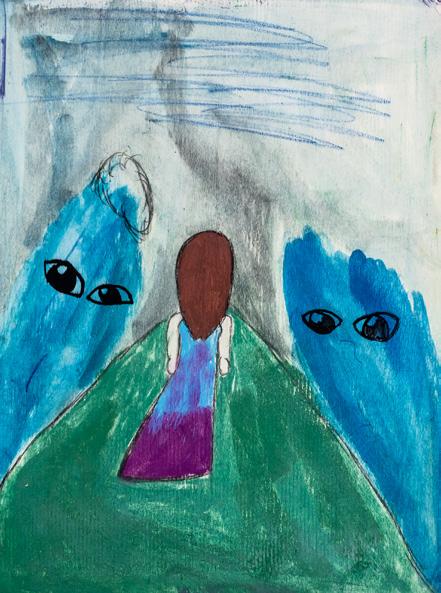



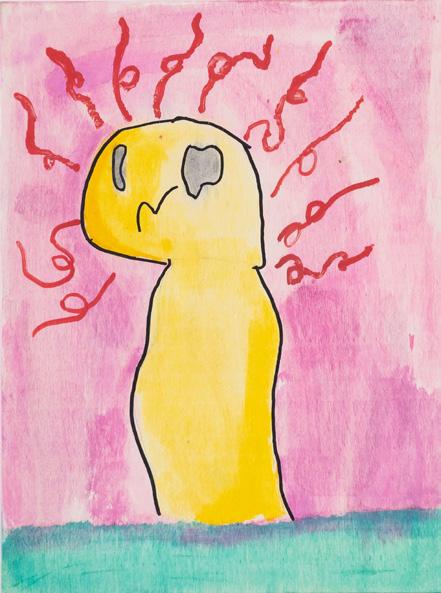



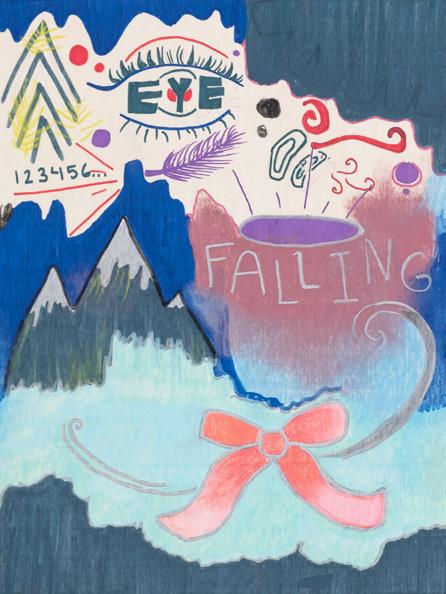
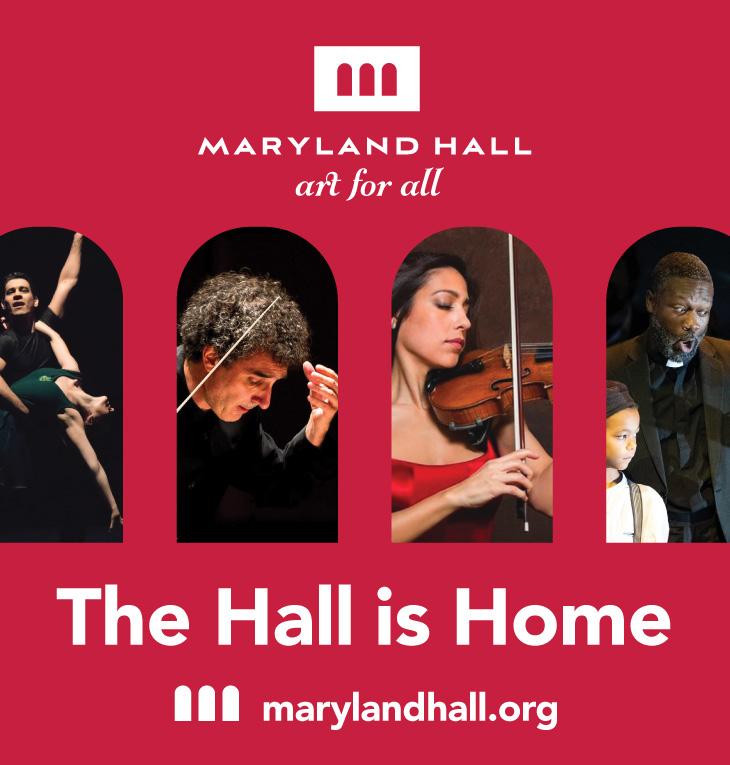

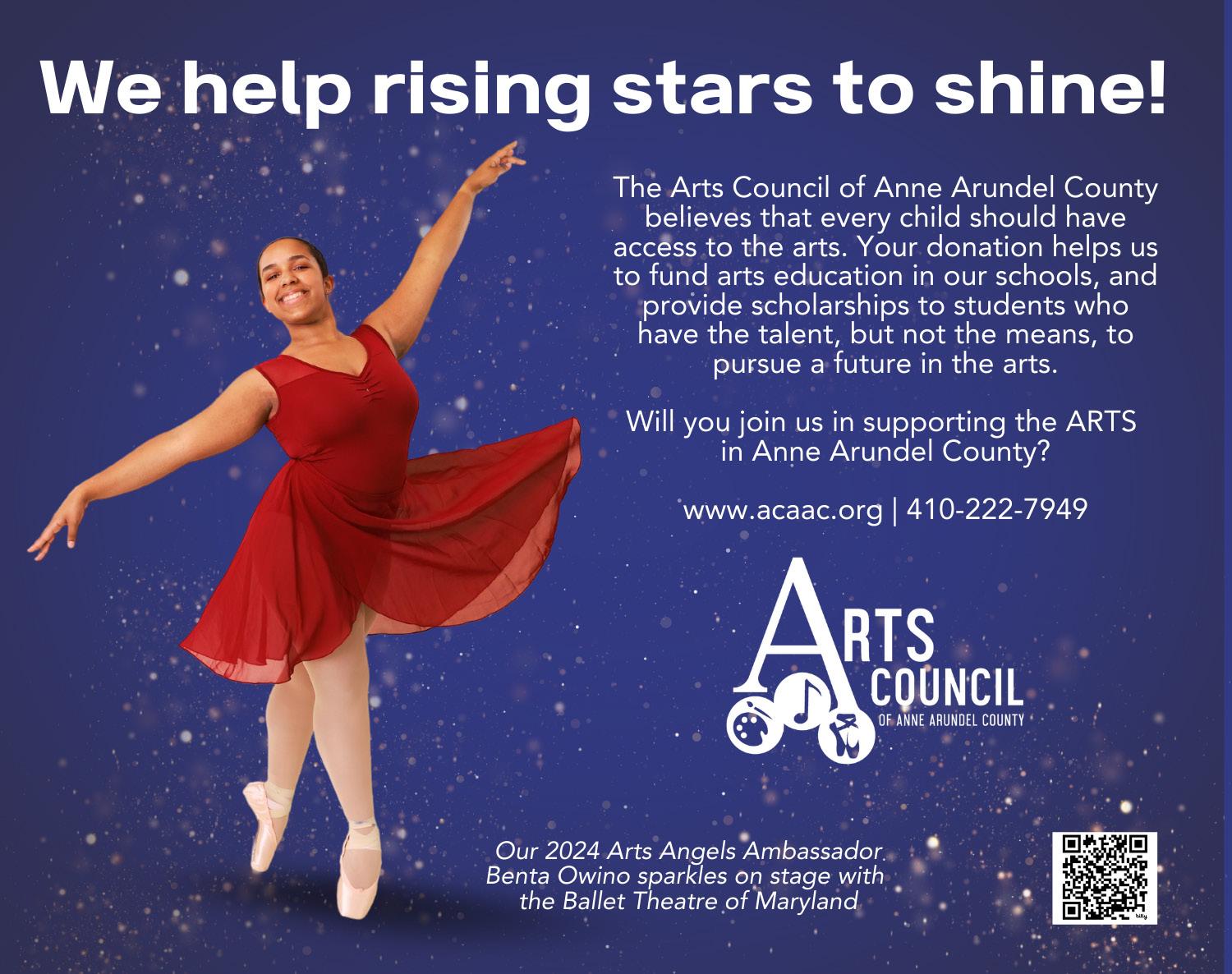












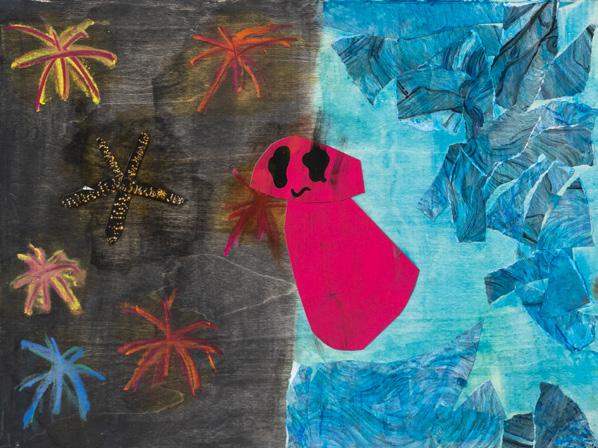




What’s Up? Media has been a proud supporting partner of the Annapolis Symphony Orchestra for over 25 Years.
Join us in a campaign to get all 55 of our currently tenured musicians sponsored! Sponsoring a musician is a transformative way to show your support for the Annapolis Symphony Orchestra. It is a special opportunity to personally connect with an individual musician and deepen your connection to the symphony.
José-Luis Novo
The Philip Richebourg Chair
VIOLIN I
Netanel Draiblate, Concertmaster
Sponsored by Jillinda Kidwell
Nicholas Currie, Associate Concertmaster
Sponsored by Laird Lott & Linda Gooden
Abby Armbruster
Sponsored by Mimi Jones
Yoon Young Bae
Sponsored by Drs. Mark Davis & Ann Tran
Susan Benac
Sponsored by Herb* & Sallie Abeles
Heather Haughn
Sponsored by Constance &
William Scott
Rachael Stockton
Sponsored by Tara Balfe
Clifford
William Wang
Sponsored by Dr. Mary C. McKiel
VIOLIN II
Kristin Bakkegard, Associate Principal
Sponsored by Stephen A. Sotack
Sally Stallings Amass
Co-sponsored by Dr. Mary C. McKiel & Rosalie Lijinsky
Megan Gray
Sponsored by Lawrence & Jeanne Kelly
Karin Kelleher
Sponsored by Prudence Clendenning
Alexandra Mikhlin
Sponsored by Anna E. Greenberg VIOLA
Derek Smith, Associate Principal
Sponsored by Al & Ginger From CELLO
Todd Thiel, Principal
The Hildegard Strothman
Martin Chair
Alison Bazala Kim
Sponsored by Dr. Elizabeth Maxwell-Schmidt & Mr. Steve Schmidt
Nicole Boguslaw
Sponsored by Norman J. Fisher & Doris Fisher Foundation
Catherine Mikelson
Sponsored by Patrick M. Green
MaryAnn Perkel
Sponsored by Florence Calvert
Daniel Shomper
Sponsored by Paula Abernethy
April Studeny
Sponsored by Judith Templeton
BASS
Patrick Raynard, Principal
Sponsored by Collot Guerard
Peter Cohn
Sponsored by Anne S. Potter
Broc Mertz
Sponsored by Fred Stielow & Susan Rosenfeld
FLUTE
Kimberly Valerio, Principal
Sponsored by William Seale & Marguerite Pelissier
Genevieve Eichman
Sponsored by Russ Stevenson & Margie Axtell
OBOE
Fatma Daglar, Principal
The Sage Tower Mumma
Endowed Chair
Rick Basehore
Sponsored by William & Renata Davis
CLARINET
Robert DiLutis, Principal
Sponsored by Shelley Row
BASSOON
Patricia Morgan
Sponsored by Ann & Robert Whitcomb
HORN
Alex Kovling, Principal
Sponsored by Martha & John T. Schwieters
Anthony Valerio
Sponsored by Carole & Richard Falk
Christopher Sala, Principal
The Philip Richebourg Chair
TROMBONE
David Perkel, Principal
Sponsored by David & Eleanor Huggins
David Sciannella
Sponsored by Robert & Kathleen Arias
Jay Heltzer
Sponsored by Peter Bungay, Joy Chambers & Ellen Posten
* Deceased
Thank you to our generous sponsors. If you’re interested in sponsoring a musician, please visit www.annapolissymphony.org/support or email development@annapolissymphony.org.
It is with our deepest gratitude that we acknowledge the following Legacy Circle Members for their commitment to the future of the Annapolis Symphony Orchestra and its place in our community.
Anonymous (3)
Melvin & *Judy Bender
Bud & *Bee Billups
Elana Rhodes Byrd
James W. Cheevers
Elizabeth Colandro
Ronald E. Council
*Forbes Leland & *Marilyn Eason
*Patricia Edwards
*Colonel Allan & *Audrey English
Patrick M. Green
Anna E. Greenberg
*Joe Bales Gruber
*Nancie Kennedy
*Dr. Michael Kurtz
Dr. Mary C. McKiel
*Mr. John P. McKim
Anne S. Potter
Susan Rosenfeld
Shelley Row
Annapolis Symphony Orchestra Inc. Tax I.D. 23-7001357 Make your
To discuss including the Symphony in your Estate Plans, please contact development@annapolissymphony.org
*Deceased
We gratefully acknowledge these generous donors to the Annapolis Symphony Orchestra who have contributed to this fiscal year as of November 15th, 2024
The Annapolis Symphony Orchestra is sustained through your generous support. We are indebted to you for supporting our music making, education programs, and community initiatives.
GIFTS OF $1 MILLION +
John McKim*
Joyce Pratt & Jeff Harris + William Seale & Marguerite Pelissier
THE PHILIP RICHEBOURG CIRCLE
GIFTS OF $500,000 – $999,999
Elizabeth Richebourg Rea +
GIFTS OF $250,000 – $499,999
Robert & Kathleen Arias +
GIFTS OF $150,000 – $249,999
The Brian & Patricia Giese Foundation
Jillinda Kidwell + Maryland State Arts Council
Michael J. Mumma, Peter R. Mumma, & Amy Mumma R askopf +
GIFTS OF $50,000 – $149,999
Anonymous +
Paula Abernethy + Jane Campbell-Chambliss & Peter Chambliss
James W. Cheevers +
Mr. Arthur & Dr. Katherine Edwards +
Laird Lott & Linda Gooden
Impact100 +
Anne S. Potter + Shelley Row +
Stephen A. Sotack +
GIFTS OF $25,000
–$49,999
Anonymous
Anne Arundel County
Recreation & Parks
Arts Council of Anne Arundel County
Elville Center for the Creative Arts +
Peter & Sarah Evans + Al & Ginger From +
David & Eleanor Huggins
Mimi Jones +
Patricia & David Mattingley + Martha & John T. Schwieters +
GIFTS OF $10,000 – $24,999
Florence Calvert +
Friends of the Annapolis Symphony Orchestra
Collot Guerard
William H. Hoff + Deb Howe +
Dr. Elizabeth MaxwellSchmidt and Mr. Steve Schmidt +
Judith Templeton + Ann & Robert Whitcomb + Cecelia Wyatt
GIFTS OF $5,000 – $9,999
Peter Bungay, Joy Chambers & Ellen Posten
Susan Byrom and Robert Thomas
Hugh D. Camitta
Prue Clendenning
Council Family Foundation
Multiyear pledges support the Orchestra’s strategic vision while ensuring a sustained level of funding. Thank you to everyone for signing pledge commitments of three years or more. These donors are recognized with a + beside their name.
Gifts of $5,000 - $9,999 cont.
William and Renata Davis +
Norman J. Fisher and Doris Fisher Foundation
Harley Flack
Capt. Mark & Michelle
Hellstern (USN Retired) + JosuahOneNine Fund
Lawrence and Jeanne Kelly
Evelin Reynolds*
Russ Stevenson and Margie Axtell
GIFTS OF $2,500 – $4,999
Herb* and Sallie Abeles
Dea Code Family Foundation
Drs. Mark Davis & Ann Tran
Carole & Richard Falk
Patrick M. Green
Anna E. Greenberg
Scott Gregory and Angela Eggleston-Howard
Pierre and Danalee Henkart
Richard and Lisa Hillman
Jan and David Hoffberger
Karl and Marge Hoke
Gifts of $2,500 - $4,999 cont. Gifts of $100 - $999 cont.
Elizabeth Mainiero
Dr. Mary C. McKiel
Music Educators of Greater Annapolis
José-Luis Novo and Lori Kesner
Steve Root and Nancy Greene
Jeffrey Scherr and Wendy Jachman
Constance and William Scott
Doug & Karen Smith + Fred Stielow and Susan Rosenfeld
Joan Ruhl
Bill and Marilynn Sweetser
GIFTS OF $1,000 - $2,499 Anonymous (8)
Michael Alin and Ann Carroll
Jack and Leslie Andryszak
Annapolis Musicians Fund for Musicians
Melvin and Judy Bender
Renee Ehler and George Bentley
Ann Burchard
Ms. Sandy Cohen
Community Foundation of Anne Arundel County
Mr. and Mrs. Andrew Lynch Cole
Enser and Marguerite Cole
Jesse Cunitz and Faith Goldstein Cunitz
Jane Danowitz
Mr. and Mrs. Robert Demoyer
Elizabeth Gordon-Bluntschli
Bonnie Gorman
Bob and Diane Heaney
Mr. and Mrs. Robert M. Hecht
Gifts of $1,000 - $2,499 cont.
David R. Herron, Ph.D.
Hugh and Deborah Houghton
The Johansen Family
Ted and Karen Kirakawa
Jim & Deb Laite
Katherine Lantz
Rosalie Lijinsky
Janet Little
Lynn Maichle
David McGill
Laura Murray
Jan O’Connor
James E and Cheryl H Painter
Beth Penn
Patricia Petrou
Barbara W. Pittman
Pamela Roeming
Rotary of Annapolis
Cynthia Scruggs
Bob Sherer
Jill Simon
Kathy Sorci
Mrs. Tamara and Dr.
Stephan Tymkiw
Barbara Wing
GIFTS OF $100 - $999
Anonymous (2)
Michael and Judy Ackerman
Anne Agee
Linda Allen
Sandra Collyear Altherr
Sally Amass
Ms. Susan Armstrong
Ann J. Baker
Adele Baron
Jess and Susan Behringer
Julie Belkin
Randall Bell
Edward Bergman
Randal Billingsley
Martha Blaxall and Joe Dickey
Ms. Jeannie Block Bessmer
Elaine Bower
Elizabeth Bowers
Pat and Karen Brown
Carmen and Nancy Brun
Carole Burchette
David Bush
Rebecca A Byrd
Cindy Carlton
Deborah Chin
Dr. Mark Cinnamon
Elizabeth Colandro
Petey Cosby
Susan Craig
Laudine Creighton
Dr. Albert A. Del Negro, M.D., FACC, and Ms. Patrisha C. Creevy, PA-C
Carl DeVore
James and Debra Dillon
Fred and Susan Eckert
Pauline Farmer
Mr. and Mrs. Millard Firebaugh
James R. Fitzpatrick
Ted and Anne Foster
David and Cindy Fox
Frederick R. Galloway
Charitable Trust
Sonja Gladwin & Rod Straw
Michael J. Gray
Frances R. Hall
Georgina Hammond
Patty Harris
Jeffrey Harvey
D. Gayle Hensley
Gretchen Herdt
Paul Herman and Karen Goldman
Maureen Hess
Marian Holt
Mr. and Mrs. Jerry Hoot
Dr. and Mrs. William Hunter
Kevin Hurley and Kathleen McDevitt
Sally W. Iadarola
Beth Jacaruso
Beth D. Jacob
Bruce and Danna Jones
Mr. and Mrs. Jordan
Kurt Karsten and Michelle Smith
Christine Kelsey
Nicholas Kemp & Kay Osburnsen
Leon and Barbara Kestenbaum
Getha Klejnot
Julia Krause
Alice F. Kurs
Dr. Monique Langston
Drs. Frank LaScala and Gladys Rivera-LaScala
Dr. and Mrs. Norman Lerner
Ellen Levin
Susanne Lieberman
Timothy and Katherine Lynch
Joan Machinckick
Robert W Madden Jr
Lynne Malley
Elaine Mines
Priscilla Mitchell
Francisco Montero
Betty Morganstern
Don and Carol Nelson
David & Carol Newman
Ed and Jeanne Paglee
Stanton D. Palmer
William and May Parks
Fariba Partawi
Bob and Cookie Pollock
John T. Quinn
Michael and Margret Rauh
Ken and Maureen Reightler
Clay and Carol Richards
Christopher and Anita Rizek
Jack Roadhouse
John and Constance Robinson
Paul and Joan Rosenberg
Janet & Michael Rowan
Amy and Joe Rubino
Joan Russell
Ellen von Seggern Richter
Mr. and Mrs. Russ Rosenberger
Chris & Donna Schein
Ken and Elaine Schmidt
Mr. and Mrs. Randy Schmitt
Scott and Virginia Schollenberger
Mr. and Mrs. Michael T. Schuncke
Leslie Skibo
Bruce Slaff
Anne Sloan
*Deceased
Roderick & Joann Smith
Bernadette Solomon
Anne K. Stratton
Brian Thiel
Paula Thistle
Peter Threadgill
Barbara Torreon
Joan Townshend
Christine Trapnell
Laura and Jack Van Geffen
Mr. and Mrs. Damien Wanner
Cynthia Wells
Mr. and Mrs. Earl S. Wellschlager
Jeffrey Williams
Claire Winestock
Bradley Wirz
Mr. & Mrs. Clifford
Woodward, Jr.
Francis and Maureen Wright
Bernard and Louis Wulff
Mark Wynn
Marion and Norbert Zacharias
We make every effort to ensure accuracy. If you notice an error, omission or would like to be recognized in a different way, please let the Symphony staff know at your earliest convenience. The Annapolis Symphony Orchestra greatly appreciates all contributors of any amount.
The Annapolis Symphony Orchestra is funded by operating grants from the Maryland State Arts Council, an agency dedicated to cultivating a vibrant cultural community where the arts thrive, and the Arts Council of Anne Arundel County, which receives public support from Anne Arundel County, the City of Annapolis, and the Maryland State Arts Council. Funding for the Maryland State Arts Council is also provided by the National Endowment for the Arts, a federal agency which believes that a great nation deserves great art.
In memory of Marion Borsodi
Sandra Collyear Altherr
In memory of Louise A. Snyder
Hugh D. Camitta
In memory of Ralph Bluntschli Elizabeth Gordon-Bluntschli
In honor of Rachael Stockton Rene Shumate
In memory of Evelin Reynolds
Ann J. Baker
In memory of Ronald Bower
Elaine Bower
In memory of David Kidwell
Dr. Mark Cinnamon and Ms. Doreen Kelly
In honor of James Cheevers Anonymous
In memory of Susan David R. Herron, Ph.D.
In honor of Illa Nelson Anonymous
In memory of Barry Amass
Sally Amass
In memory of Charlie L. Byrd
Rebecca A. Byrd
In honor of Mrs. Marguerite Cole Anonymous
In honor of Miriam Fogel
Beth D. Jacob
In memory of Marc and Kirk Elvy Cecelia Wyatt
Generous friends of Howard and Thea Pinskey established a scholarship fund in their memory dedicated to providing financial assistance to students in the Annapolis Symphony Academy. The Annapolis Symphony will also add funds given in memory of Howard and Thea Pinskey to this scholarship fund in their memory. If you would like to contribute to this fund, visit www.annapolissymphony.org/support.




FASO is a dynamic group of music lovers who support the Annapolis Symphony Orchestra. FASO fundraising events include the Concert of Tastes, Historical Happy Hour, themed dinners, Dine-toDonate, Movie & Trivia Nights, wine tastings at local vineyards, international trips and much more. FASO collaborates with the Annapolis Symphony Academy to provide grants that expand programming and provide scholarships. FASO efforts expand beyond Annapolis. FASO recently sponsored the featurelength film Sing to Me Sylvie, which won the Spotlight Award from the Volunteer Council of the League of American Orchestras. Join us! Become part of the fun while helping to benefit the Annapolis Symphony Orchestra and rising artists. IT IS EASY TO JOIN - VISIT ANNAPOLIS SYMPHONY.ORG
Membership: $50 per person | $75 per couple Contact info: 410-267-3646 friends@annapolissymphony.org

2024-2025 Board of Directors
Officers/Executive Committee:
Ann A. Tran, President
Marguerite Cole, Vice President
Ways & Means
Paula Abernethy, Vice President
Membership
Julie S. Grudzinskas, Treasurer
David Bush, Recording Secretary
Carol Richards, Corresponding Secretary
Directors:
Adele Baron
John Andryszak
Adele Baron
Jim Cheevers
Betsy Chotin
Kathy Clatanoff
Renee Ehler
Robert Foye
Elizabeth
Gordon-Bluntschli
Diane Green
Patrick Green
Anna E. Greenberg
Valerie Gutterson
Stephen Holt
Marilyn Lyons
Lynn Maichle
Mary McKiel
Rick Sullivan
The Friends of the Annapolis Symphony Orchestra is a 501(c)(3) organization. Dues and donations are tax deductible to the fullest extent of the law, providing no goods or services are realized by joining.


Learn more about the impact we make in our community
In 2023, the ASO sold nearly 9,000 tickets, generating approximately $350,000 in revenue. According to a study by Americans for the Arts, each attendee spends an additional $31.47 per event on meals, parking, and lodging, contributing over $270,000 to local businesses. Concertgoers from outside the county spend even more, underscoring the ASO’s significant economic impact.
The ASO's influence extends beyond the concert hall. In Season 62, we performed 68 live concerts, with over 10,000 people enjoying our free performances at community hubs like churches, schools, hospitals, and museums. We proudly partner with local medical facilities, bringing music to front-line workers, patients, and their families. Our collaborations include Luminis Health/Anne Arundel Medical Center, Hospice of the Chesapeake, and The Wellness House of Annapolis.
The ASO frequently performs at community events, including memorial services, the downtown Annapolis Christmas Tree lighting, and holiday celebrations at the Maryland State House. Our educational initiatives reached over 2,600 Maryland students last year, with many experiencing orchestral music for the first time. We subsidize tickets for school and family concerts, ensuring accessibility for all. We’re thankful to our community partners and sponsors, who enable us to continue this important work.
COMMUNITY ENGAGEMENT PARTNERS:
Maryland Hall
Music Center at Strathmore
Bowie State University
Kerr Center for the Performing Arts
The City of Annapolis
Anne Arundel County
Department of Parks and Recreation
Quiet Waters Park
Downs Park
St. John’s University
Banneker Douglass-Tubman Museum
Maryland State House
Chesapeake Arts Center
Luminis Health Anne Arundel Medical Center
The Wellness House of Annapolis
Anne Arundel County Public Schools
AACPS APEX Arts
Magnet Program
Bates Middle School
Brooklyn Park Middle School
The Salvation Army of Annapolis
Marshall Hope Learning Center
Robin Wood Community Center
Housing Authority of the City of Annapolis
USNA Music Department
The Annapolis Opera Hospice of Chesapeake
Luminus Health Pathways Alcohol and Drug Treatment Center
Luminus Health J. Kent McNew Family Medical Center
Elville Center for the Arts
Temple Beth Shalom
The Wellness House of Annapolis
Maryland State Arts Council
Arts Council of Anne Arundel County
Elville Center for the Creative Arts
Friends of the Annapolis Symphony Orchestra (FASO)
Community Foundation of Anne Arundel County
Impact 100 Chesapeake Chapter
Ken Code, Dea Code Foundation
Council Family Foundation
JoshuaOneNine Fund
The J.M. Kaplan Fund
The Dealy Foundation, Inc
Paige Miller Memorial Scholarship
National Philanthropic Trust


Rotary of Annapolis
Annapolis Musicians Fund for Musicians
Lewis Family Fund Grant
Pew Foundation
Progress Family Foundation
Charities Aid Foundation America
Frederick R. Galloway Charitable Trust
The Links, Incorporated
Loaves & Fish 247 Fund
Music Educators of Greater Annapolis
Pledgeling Foundation
Schmidt Family Charitable Fund
U.S. Charitable Gift Trust
United Way of Central Maryland






Use of cameras or recording devices during the performance is strictly prohibited.
Latecomers will only be seated at the conclusion of a musical selection.
Please note the nearest exit to your seat. In the event of fire or another emergency, WALK — do not run — to that exit.
In the event of severe weather, every effort will be made to continue with scheduled concerts. No refunds will be given if a concert is performed during severe weather but not attended by the ticket holder.
Maryland Hall is a smoke-free facility. Smoking is prohibited in and on the grounds of the building.
Enjoy a beer or glass of wine before the concert and at intermission in room 206. Cash and credit cards are accepted and drinks are allowed in the concert hall.
Parking, ramp, and elevator facilities are available at the entrance nearest Spa Road. Wheelchair accessible seating is also available. Please call 410-263-0907 to make arrangements.
Subscribing to the Masterworks Series at the Annapolis Symphony Orchestra is the best deal around! As a subscriber you get exclusive access to a 20% discount on single tickets, priority seating, and free exchanges. Subscriptions are available for all 5 Masterworks concerts as a full series or 3 or 4 concerts as a Flex Pass. Learn more at annapolissymphony.org/ subscribe.
Whether it’s your first or fifth time at the Symphony, single tickets are always available for purchase! Tickets can be purchased online at annapolissymphony. org/events or by calling the Symphony Box Office at 410-263-0907.
We are dedicated to making your group‘s visit to the Annapolis Symphony a memorable experience. With a group of 10 or more, receive a 15% discount on all tickets.
Subscribers may exchange their tickets for the alternate performance of the same concert only. Exchanges are subject to availability.
Subscribers may donate tickets back to the Symphony as a tax-deductible contribution. We will mail you an acknowledgement letter for your donation.
There are no refunds and all ticket sales are final. If there are changes to the program, ticket holders will be contacted with options.

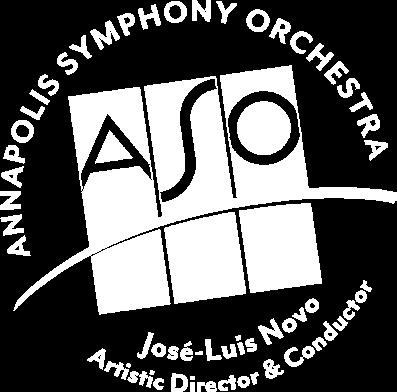
SYMPHONY . ORG